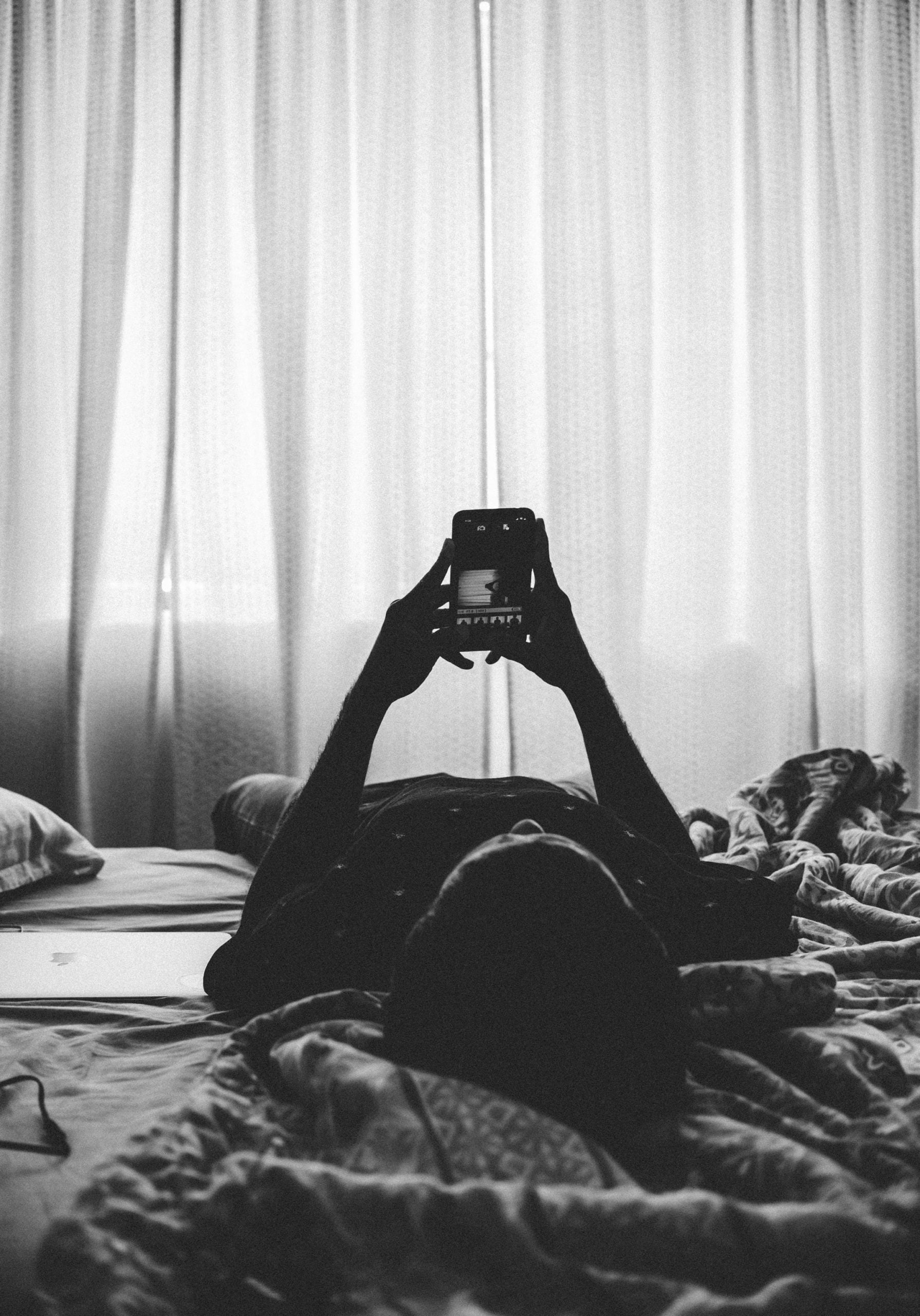When you are an introvert, making friends isn’t as easy as it should be. What’s natural for others, might be a socially awkward situation for those who are introverts. Most of the time, they feel like they don’t need friends in the first place because they prefer their own company anyway.
That’s a dangerous path to go down on, one that leads to a lot of suffering and loneliness. Even for introverts, friendships are a crucial part of life, even though they are different compared to the majority of friendships. However, there is something that introverts can easily develop that hinders their finding friends even further: social anxiety.
When you are not only an introvert, but you also suffer from social anxiety, your task at finding – and keeping – friends seems almost impossible. The idea of making friends in the first place can be so overwhelming, that you decide at the very beginning that it’s not worth the trouble.
Making friends as an introvert with social anxiety is hard and a long process, but it isn’t impossible. If you give enough time, energy and room for planning before beginning to look for a friend, you will make your life much easier. It’s key to know your limits and the triggers that set your anxiety off. If you find a way to keep yourself grounded, and then look for friends who might have similar issues, fears, goals and interests, then you are halfway there already.
But of course, that’s easier said than done. We get that. And that’s why we made a comprehensive guide, so you can find a way that works for you. If one step doesn’t seem like it would work for you, feel free to skip it and even implement your strategies.
This is but a guide to help you comprehend what’s going on in your mind right now, and how to still make and keep friends, even when every fiber of your body is screaming against it. You know it will help in the long run, and it might even assist you in living with your social anxiety.
Some say that friends are a remedy in themselves, but the issue is that even though you know there is a cure out there, getting it is a completely different project entirely.
How to Know You Have Social Anxiety, or You are ‘Just’ an Introvert
Being an introvert, a bit socially awkward and scared of public events in itself is hard enough when you are trying to make friends. But how do you know whether that’s your ‘only’ issue (even though it feels like it’s a huge one, and it is), or whether it’s something more serious?
Having social anxiety sometimes isn’t that evident. You could have mild symptoms, which can easily be mistaken for nerves. But the more signs show up, the more convinced you are that something is seriously wrong with you.
Well, let us stop you there. Just because you have a condition, it doesn’t mean that you are broken. It simply means that you have certain difficulties that you need to face every day. And that’s hard, and it’s probably harder than what anyone else around you is going through. They don’t understand why you have a slight panic attack before going to the shops, even though you explain it to them a thousand times.
Rest assured that even if people don’t get what you mean, you aren’t alone. There are many people who are living with the same condition you are, and some of them are coping better than others. There are good and bad days, of course, for everyone, but those with social anxiety, even going to the local store can be a challenge.
If you find that you have many of the symptoms below, try not to panic. Your instinct will be to shut everything out and go back to your safety net, which will probably be a cozy corner in your bedroom, a cup of tea and an interesting book that will keep you secure and safe for a while.
And if that’s what you do at first, that’s okay. Try not to beat yourself up about your decisions and actions. Rome wasn’t built in one day, and, if you do find that you have social anxiety, please don’t give up trying to make friends. As we said earlier, it won’t be easy, but it isn’t impossible either. Of course, this is a guide and not a medical examination, so if you feel like you need professional help, don’t hesitate to take action.
So, here are some of the things you can look out for to decide whether you have social anxiety, or you are ‘simply’ an introvert:
Physical Symptoms
When someone is an introvert, they tend to prefer staying at home alone or with a close group of friends. Partly because they don’t like crowds, and partly to avoid confrontation and stay safe doing something they love. Most of their favorite hobbies can (and should) be done indoors, anyway.
But here’s the thing: when your being introvert is mixed with social anxiety, then the mere idea of going out will terrify you. Some days it might simply show up as a headache, that turns into a migraine. You might even find that you are glad it’s there because at least you have a valid excuse why you can’t go out.
And that’s fine, as an introvert, you probably already have a few excuses up your sleeve anyway (without saying that you lie to people, of course). But when you have social anxiety, this could escalate and even give you diarrhea, a blurred vision, chest pain, palpitations, it can make you dizzy and you might even experience out of body moments when you don’t know what’s real and what isn’t.
The list is almost endless, and it varies from person to person, but one thing is common: whatever physical symptoms you might have, they all make you feel even more unsure of yourself.
So, even if the night started with you deciding that things will be different this time, you say no to the invitation last minute, feeling even worse, because you let yourself and everyone else down. A little advice: don’t. No matter how many times you say no, there is still time to fix things. Beating yourself up about something your condition forces you to do (because let’s face it, you aren’t really in control) isn’t fair on you.
Mental Symptoms
Apart from physical symptoms, social anxiety can leave you with mental scars every time an invitation pops up. Your mind will constantly be in overdrive, trying to cite all the pros and cons, but deep down you already know that all the cons will eventually outweigh the pros.
When you have social anxiety, you live in your mind a lot. You overthink and overanalyze every event you are about to go to. But the issue is, that this is just the tip of the iceberg. Let’s face it, you go through this list even when you are an introvert. But the difference is that as an introvert, there is still a chance that you can be convinced, should there be more benefits to the outing than negatives against it.
However, when you suffer from social anxiety, the negatives never stop coming. This condition is often paired with depression and paranoia, which could mean that you would think everyone is against you. You will start questioning why your friends asked you out in the first place, looking for their ulterior motive, because, according to you (or according to your condition, rather), everyone has one.
And yes, sometimes that’s the case, but when you have social anxiety, you don’t always listen to reason. Whether your friends simply wanted to have a good time with you or not doesn’t matter, because you have already conjured up these conspiracy theories in your mind, and those aren’t easy to change.
Emotional Symptoms
A mixture of the physical and mental symptoms of social anxiety will leave you drained and sometimes you even feel like there is no point in the whole thing. You might as well be alone because you keep canceling everything you are invited to.
This emotional roller-coaster of feeling down one minute, then hopeful the next, eventually crashing on a massive low can have a negative impact on your help. And, naturally, you look for the main trigger, which in this case is social gathering and friends, and you will try to stay away from both.
Telling you not to do that would be wrong. Sometimes you do need to distance yourself from the situation to get a deeper insight into how to get back into it. And as long as you don’t give up entirely, a little break can’t hurt. Remember, if you don’t feel like you are up for it, then you know you are bound to let history keep repeating itself, instead of helping you shift the pattern.
Know Yourself First, Find Friends Later
Whether you are an introvert with or without social anxiety, you need to know yourself before you try to figure any of this out. Think about all the ways you are putting yourself down in the first place. How many times do you recognize the achievement of yours, no matter how small?
If the answer is often, then you are ready for the next step, but if it’s no, then you should work on yourself a little before making friends. If you think about it, having a friend should be a pleasurable experience, not something that makes you question yourself even more.
The problem is that we either look for friends who are like us, or ones that are the complete opposite. Now, if you are not comfortable with the way you are, and your new friends show you a mirror into your soul, your instinct, once again, will be to run and never look back.
However, if you do your research properly – meaning both about you and friendships in general, then moving onto the particular friends you are trying to attract – then your chances of success are much higher. Yes, even if you are an introvert with social anxiety.
And of course, we can never account for every single scenario, so the plan won’t be perfect. So, try not to expect it to be. But what the research helps you with is confidence, which is always key to making and keeping friends. Remember, knowledge is power. And that’s especially true in this case. If you know who you are and what you can expect, things will get much easier.
How to Find Friends When You Have Social Anxiety
We can research steps of finding friends everywhere, but having social anxiety normally means that all those steps look like scary obstacles, instead of the small tasks they should be. Here is a list of things you can do before you proceed onto the big stuff, to make your transition into friendships easier.
Just remember: just because you have hiccups and bumps on the road, and just because your road is harder than others’, it doesn’t mean that taking steps in the right direction won’t get you where you need to be.
It might take longer, and you might be going backwards a few times, but have faith that things will work out eventually.
Do Your Research
Whether this is your first attempt at making friends when you have social anxiety or the thousandth time, if you research the ‘game field’, you have a better chance at succeeding. But what do we mean by that?
Research can be anything from looking up local events where you could bump into like-minded people, or even reading the news. Having things to talk about is always one of the worries of introvert people, especially since most of their interests don’t involve adventures. Reading and being able to talk about others’ adventures, however, can help both in making friends and becoming more adventurous yourself.
Of course, there is nothing wrong with being an introvert and preferring indoor activities, but it doesn’t mean you can’t find other things interesting, too. Opening your horizons this way is always a bonus.
Make a List of People You Already Know
Even if you are an introvert with social anxiety, you are bound to know a few people. True, you might be able to count your potential friends on one hand, but that’s okay. All you need is one, to begin with. Try not to put too much stress on it, either. The more you do, the more difficult it will be.
Although you know these people, try not to act like you know everything about them. Make a list of things you like to tell people about yourself, then turn them into questions. Do your research on what’s ‘expected’ from a new friend, although simply being there to listen is normally enough, as well as being compassionate to what the other person is saying.
People around you might surprise you. Friends come in all shapes, forms and sizes, and it could be that you already know them. The truth is, when you have close to zero friends, you can’t afford to be too picky – within certain boundaries, of course.
If face to face interaction fills you with dread, then try Facebook, other social media, or text. Many people with social anxiety find that not having to talk straight away helps ease their stress when trying to make friends.
Also, don’t focus too much on what they say. Taking it lightly is always key, at least at first. You don’t want to tell them your life story on day one. Think about this as a date. The same principles apply, but instead of first base, you shouldn’t get to discussing your childhood just yet.
Common Interests & Goals
Is there any book or creative clubs around you? The idea is to find people with whom you already have something in common, so those initial awkward conversations are less likely to happen (you know, the ones that set your anxiety off).
Again, make a list of all the things you enjoy doing, or would love to try – no matter how small or silly they sound – and then do your research. If you need to travel a bit, that could be a challenge with social anxiety, but not if you look at it as part of your treatment.
Set small goals for yourself, with a reward at the end. Make a list, and we can’t stress that enough. When you have anxiety, feeling grounded is sometimes the only thing that keeps you from slipping into that dark hole further. If you have a list (as long as it’s not too long, unachievable or overwhelming) you have a focus point to turn to, even on those days when you don’t even want to think about making friends.
Another way to find likeminded people is by looking at your goals. Classes at school could be a good way to start. For example, if you want to be an artist, and there is someone else in the class who has the same dream as you, then you already have something to talk about.
Be careful though: if both of you are introverts, you need to make sure that your goals don’t end at the planning stage. On the other hand, this could be an excellent motivator as well. As long as you both have this goal in common, there is going to be a reason to stay friends, so even that bit becomes easier. You will want to stay in touch with someone who inspires you to follow your dreams, right?
Similar Issues
Who could understand you better than those who are going through similar issues as you do? Of course, this means that you first need to admit that what you have exists, and also that you aren’t the only one suffering from it.
But once you manage to get past that initial stage of denial, there are plenty of groups where people can discuss their issues and make friends. Give it a go and see if it is for you. But be careful and make sure you can sift the positive out of every situation before you do so. You know yourself, and your situation isn’t easy, so others’ situation won’t be easy, either.
On the other hand, this doesn’t necessarily mean that it’s all going to be doom and gloom. A friendship that starts because both of you have social anxiety can benefit you in many ways. Why? Because there is no need for awkwardness and there is no lack of understanding.
Although your case might be different than your new friends, it is more than likely that you will understand what the other person is going through. And, if neither of you feel like talking, that meeting won’t feel like you need to say anything, because you will both understand and can potentially help each other deal with their anxiety, even reducing it eventually.
Don’t Be Critical (of you and others)
Even without social anxiety, we tend to be critical and judgmental towards others and ourselves, too. The key here is to change that. Think of all the positive things you have achieved – even if today that only means getting out of bed.
When trying to make friends with social anxiety, it is important to meditate as much as you can, and use other calming and grounding techniques, such as awakening all of your senses by finding things around you that you can see, feel, touch, smell, taste.
Positive thinking is always important, but in the case of social anxiety, it is crucial. The good news is that even if you feel right now that there is no way you can be positive while so many things are going wrong and you don’t have any friends to support you, there is a way out.
Positive thinking can be practiced, and, if done for at least a few minutes every day, it will eventually become a part of your routine. It’s catchy, too, so your good mood will make it easier to make friends.
Just think about it for a second. If you are faced with a choice to either approach a woman who is smiling broadly at you, or one that has her eyebrows furrowed, which one do you approach? It’s an instinct to be drawn to happy people, so if you are happy, others will be drawn to you.
Of course, because of your social anxiety, you don’t want to go over the top, because gaining too many friends too quickly can be just as overwhelming for you as not having any. Practice, rinse and repeat, and eventually it will come to you.
Be Open to Invites
You’ve got that first invite from a new friend. Awesome! But now your anxiety is kicking in, making you second guess yourself. Should you have said yes in the first place? Do you still want to go?
Try to keep an open mind. It won’t be easy, but what’s the worst that could happen? If it’s a party, you might have to talk to people you don’t know. Again, do your research, as in go deep within and go through the possible scenarios. Hopefully, by now things have improved, so you can decide after ‘researching’ the potential outcomes and pitfalls whether it would be worth it or not.
You will probably say no a few times, but that’s okay. Rome wasn’t built in a day, and your social anxiety will, unfortunately, get in the way sometimes. The key is not to blame yourself for it and try to move on. Tomorrow is a new day that will bring new opportunities and a new you.
Try to Initiate More Often
Instead of dreading where your friend will invite you to next, try to come up with an idea first. Is there somewhere you always wanted to go, something you’ve always wanted to see? It doesn’t have to be dangerous, far or expensive. It doesn’t even need to take you out of your comfort zone, because feeling like you are in control is a massive help when you have social anxiety. You might even want to take your friend to a tried and trusted place first, to make it easy for you.
And then, once you have gained enough confidence, go for that thing you always wanted. Sometimes what scares us is exactly what we should do, because it holds a promise of something amazing. Doing it with someone could give you the extra courage you need to make it happen, even if you have social anxiety.
Try doing it with your friend only at first, until you get used to the idea of doing it in a group. And, if you feel like you aren’t up for it yet, give yourself time. And again, don’t be upset with yourself if it takes longer to get accustomed to the idea than you thought it should.
Sometimes we can do things straight away, while other times we are so full of fear that we need to work on that first, otherwise we might end up with a negative experience. This could also deter us from doing that thing again, making us feel that we wasted our time, and it could potentially deter us from keeping the friendship, too, due to embarrassment and shame.
Even if you went to an event with your new friend and it didn’t work out, don’t blame yourself. If you have never been there or done that, you couldn’t have known it would go wrong. Try to start your next adventure with a clean slate.
Stay in Touch
When you form a friendship, it doesn’t end at the first social gathering. You did your research, and you nailed all the steps, which is great, but how do you keep that friend?
The good news is that you don’t need to constantly keep looking for new things to talk about. With practice, you will be able to let the conversation flow freely and effortlessly. Simply staying in touch and making sure your friend knows that you are interested in what’s happening with them is a great start.










